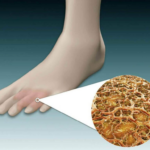There are differences in the causes, onset of symptoms, and treatment of type 1 and type 2 diabetes. Having type 1 or type 2 diabetes means there is too much glucose (a type of sugar) in your blood due to a problem with the hormone insulin. Both are serious conditions that can lead to severe health complications.
In type 1 diabetes, the body cannot produce insulin. The insulin-producing cells have been destroyed by the immune system, which makes type 1 an autoimmune disease. Type 2 diabetes, on the other hand, is not an autoimmune condition. In this case, the body does not produce enough insulin, or the insulin available does not work effectively, which can happen for various reasons.
Type 1 affects about 8% of people living with diabetes, while type 2 accounts for approximately 90%. Additionally, there are other less common types of diabetes.
Regardless of the type of diabetes, having access to proper information, treatment, and support is crucial to managing the condition.

Key Differences Between Type 1 and Type 2 Diabetes
Causes
- Type 1: The immune system attacks the cells in the pancreas, preventing insulin production.
- Type 2: The body does not produce enough insulin or the insulin produced does not work properly.
Risk Factors
- Type 1: The exact causes are still unknown, but family history slightly increases the risk due to associated genes.
- Type 2: Age, family history, ethnicity, waist circumference, and being overweight or obese are risk factors.
Symptoms
- Type 1: Symptoms appear quickly.
- Type 2: Symptoms may be subtler and develop more slowly, making them easier to overlook.
Management
- Type 1: Insulin therapy is necessary, along with monitoring carbohydrate intake. Healthy eating, physical activity, and regular medical checkups are also important.
- Type 2: Sometimes managed without insulin or medication, through healthy habits and regular medical care.
Cure and Prevention
- Type 1: No cure exists yet, but research is ongoing.
- Type 2: It cannot be cured, but many cases can be prevented or even put into remission through lifestyle changes, such as weight loss.
Risk Factors Specific to Each Type
While much remains unknown about risk factors, family history and genetics slightly increase the likelihood of developing both types. Other factors, such as age and ethnicity, are more closely linked to type 2.
- Type 1: Often diagnosed in childhood but can occur at any age. It is more common in people under 40.
- Type 2: The risk increases with age and varies by ethnicity. For instance, white individuals over 40 and African-Caribbean, Black African, Chinese, or South Asian individuals over 25 are at higher risk.

Common Symptoms of Both Types
Shared symptoms include:
- Frequent urination, especially at night.
- Extreme thirst.
- Persistent fatigue.
- Unintentional weight loss.
- Genital itching or recurrent thrush.
- Slow healing of cuts and wounds.
- Blurred vision.
- Increased hunger.
The difference lies in how symptoms develop. Type 1 symptoms appear rapidly and can lead to a serious condition called diabetic ketoacidosis (DKA) if untreated. Type 2 symptoms are more subtle and can go unnoticed for years.
Emotional Impact of Diabetes
Living with a chronic condition like diabetes can be emotionally challenging. Many people feel overwhelmed and frustrated by the need to educate others about the disease and deal with associated stigma.
Support is available, such as helplines, forums, and local groups where you can share experiences and seek emotional assistance.
Research and Advances
Currently, there is no permanent cure for either type of diabetes. However, promising research is underway. For type 1, new treatments may delay the onset in at-risk individuals. For type 2, evidence suggests that diet changes and medical interventions, such as low-calorie diets or surgery, can lead to remission in some cases.
These research efforts aim to transform care and ultimately find a cure for both types of diabetes.

Blood Sugar Control and Natural Supplements
Proper blood sugar control is essential for maintaining overall health and preventing complications related to elevated glucose levels, such as type 2 diabetes and cardiovascular issues. Fortunately, in addition to a balanced diet and regular exercise, natural supplements can contribute to blood sugar regul
Natural Supplements and Glucos
Several natural supplements, including herbal extracts, vitamins, and minerals, have been studied for their potential to support glucose control and promote metabolic well-being. Strategic combinations of these supplements may offer more effective results than taking them individually. Some well-k
- Cinnamon Extract: Hel
- Berberine: Suppor
- Fenugreek: Pro
- Magnesium: An
- Alpha-Lipoic Acid: Acts as an
Combination S
Based on research, some combined supplements are designed to provide comprehensive support for blood sugar control and often contribute to weight loss as well. Specific formulations may include a blend of herbal extracts, minerals, and bioactive compounds that work synergistically to deliver benefits.
Pote
- Glucose Regulation: Helps maintain blood sugar levels within a healthy range.
- Improved Insulin Sensitivity: Reduces insulin resistance, a key factor in type 2 diabetes.
- Metabolic Support: Enhances overall metabolic health.
- Reduction of Complications: Contributes to the prevention of complications associated with high glucose levels.
Recommendations
The choice of supplements should be based on evidence and preferably under the guidance of a healthcare professional. Additionally, it is important to combine supplement use with healthy habits, such as a balanced diet and regular physical activity, to achieve the best results.
If you are interested in exploring natural supplement options for blood sugar control, consider the following well-known products in the market:
Click here to learn more about Sugar Defender.

Click here to learn more about Cellucare.

Click here to learn more about Glucotil.

Click here to learn more about GlucoTrust.

Click here to learn more about Free Sugar Pro.

Click here to learn more about GlucoBerry.

Click here to learn more about Gluco Shield Pro.

Click here to learn more about Sugar Support.


This post is for general informational purposes only. It should never be considered a substitute for advice provided by a physician or other qualified healthcare professional. Always seek the advice of your physician or other qualified health provider with questions you may have regarding your health or medical condition. Some of the links above are affiliate links, which means I earn a small commission when you purchase through them, at no extra cost to you. I don’t align myself with any brand that I don’t love, use and trust 100%.
Content from https://www.diabetes.org.uk/

Dr. Sarah Miller is widely recognized as an influential leader in the healthcare field, with a career marked by excellence, innovation, and dedication to improving human well-being. Combining exceptional academic knowledge, clinical experience, and a deep commitment to research, she has become a reference in her specialty.






